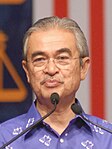| |||||||||||||||||||||||||||||||
All 222 seats in the Dewan Rakyat 112 seats needed for a majority | |||||||||||||||||||||||||||||||
|---|---|---|---|---|---|---|---|---|---|---|---|---|---|---|---|---|---|---|---|---|---|---|---|---|---|---|---|---|---|---|---|
| Registered | 10,740,228 ( | ||||||||||||||||||||||||||||||
| Turnout | 75.38% ( | ||||||||||||||||||||||||||||||
| |||||||||||||||||||||||||||||||
 Results by constituency | |||||||||||||||||||||||||||||||
| |||||||||||||||||||||||||||||||
General elections were held in Malaysia on Saturday, 8 March 2008. Voting took place in all 222 parliamentary constituencies of Malaysia, each electing one Member of Parliament to the Dewan Rakyat, the dominant house of Parliament. State elections also took place in 505 state constituencies in 12 of the 13 states (excluding Sarawak) on the same day.
The 11th Parliament was dissolved on 13 February 2008, and the following day, the Election Commission announced nominations would be held on 24 February, with general polling set for 8 March.[1] State assemblies of all states except Sarawak (due to election in 2006) also dissolved and their elections took place at the same time.[1]
Political parties were reported to have begun preparations for the polls as early as January 2008.[2] As in 2004, the incumbent Barisan Nasional coalition, the ruling political alliance since independence, as well as opposition parties represented primarily by Democratic Action Party (DAP), the Pan-Malaysian Islamic Party (PAS), and People's Justice Party (PKR) contested the election.
As with all preceding general elections following independence, the parliamentary election was won by BN, but this election also yielded the worst results in the coalition's history until the election ten years later. Opposition parties won 82 seats in the 222-seat Dewan Rakyat and 47.79% of the vote, while BN only managed to secure the remaining 140 seats and 51.39% of the vote.
It marked the first time since the 1969 election that the coalition did not win a two-thirds supermajority in the Malaysian Parliament required to pass amendments to the Malaysian Constitution. In addition, five of the twelve contested state legislatures were won by the opposition, compared with only one in the last election but Perak was retaken by Barisan Nasional after 11-month administration by Pakatan Rakyat coalition.[3][4] This marked the end of Abdullah Ahmad Badawi's tenure as Prime Minister before his handover to Najib Razak several months later.[5]
As of the 2022 general election, this is the last time the National Front won the overall popular vote.
- ^ a b "Nomination day on Feb 24, polls on March 8". The Star. 14 February 2008. Archived from the original on 21 February 2013. Retrieved 14 February 2008.
- ^ "Election dry runs almost done". The Star. 10 January 2008. Archived from the original on 21 May 2011. Retrieved 22 January 2008.
- ^ "Election setback for Malaysia PM". BBC News. 8 March 2008. Retrieved 9 March 2008.
- ^ Yin, Koon Yew (2 October 2012). "Learning from the Perak constitutional crisis". Malaysiakini.
- ^ "Najib Razak Sworn in as Malaysia's Sixth Prime Minister". CNBC. 3 April 2009.

